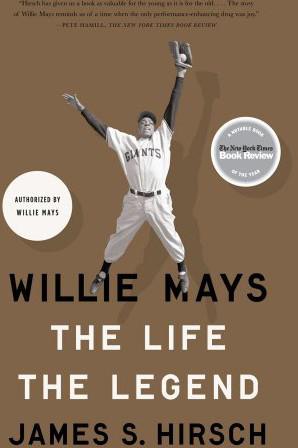Mr. Book just finished Willie Mays: The Life, The Legend, by James Hirsch.
One of the many highlights of this excellent biography on Mays was what it mentioned all of the other teams that Mays could have joined. He became very close to being teammates with Hank Aaron. In 1950, the Braves and Mays were ready to agree on a deal for $7,500 as soon as he graduated from high school. But, then they sent one more scout to watch him play, who determined he couldn’t hit major league pitching. A Braves scout later admitted that the real problem was the Braves already had Sam Jethroe, who was on his way to the Rookie of the Year Award. Bringing in two black outfielders too close together was just too much for them. Two years later, they signed Aaron.
A year before that, he could have been a Pirate and eventually teammates with Clemente. In 1949, his Negro League manager, Piper Davis, offered to sell him to the Pirates for $2,000. The Pirates weren’t willing to pay and also said they probably would have just turned him into a pitcher. He could have been a Dodger. Roy Campanella begged them to sign him, but their scout said he couldn’t hit curveballs, but the Dodgers real problem was they were already at the “magic number” of too many black players at once—5. He was scouted by the White Sox, Red Sox (their scout said he was the best he ever saw, but they were owned by the racist Tom Yawkey, and they had already signed their token black, in Davis, who they never did promote to the majors) and Yankees (the problem there being their racist GM George Weiss).
Among the many highlights of this book was its discussion of Mays’s life in the Negro Leagues, his early struggles when he was called up to the majors, the Giants’ 1951 comeback, the 1951 World Series, Mays’s relationship with Leo Durocher and him being drafted into the army and his time there.
Other highlights included Mays’s first MVP season in 1954, his only World Series championship that season, discussions of the racial injustices that he was forced to endure, the 1962 World Series, his 1965 MVP season, his four home run game, his relationship with Jackie Robinson and his different stances of civil rights issues and others’ reactions to his positions.
By my calculations, Mays should have won definitely five MVP awards. In addition to the two he won, in 1954 and 1965, he should have won in 1955, 1963 and 1964. Good cases could also be made for him in 1957, 1958, 1960 and 1961. The book discusses Mays losing the 1962 MVP vote to Maury Wills—in a year in which Frank Robinson was clearly the best player in the league—but otherwise does not get into him being snubbed in MVP voting.
I give this book an A+. Goodreads requires grades on a 1-5 star system. In my personal conversion system, an A+ equates to 5 stars. (A or A+: 5 stars, B+: 4 stars, B: 3 stars, C: 2 stars, D or F: 1 star).
This review has been posted at my blog, Mr. Book’s Book Reviews, and Goodreads.
Mr. Book originally finished reading this on May 25, 2021. He then listened to it on audiobook, finishing that on May 10, 2024, before rereading it to write this review. The review was written on June 21, 2024.


